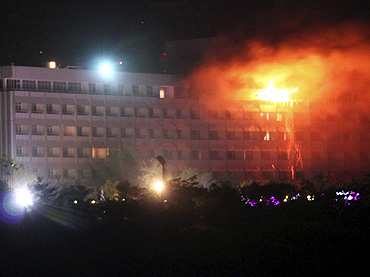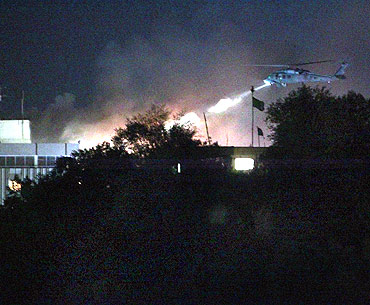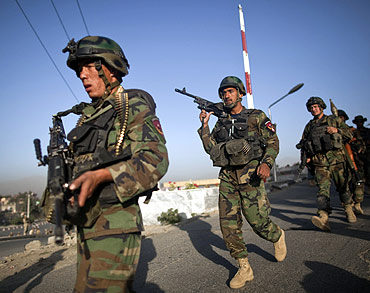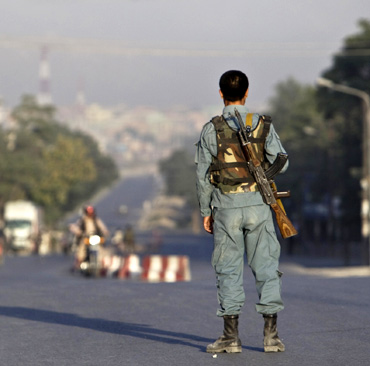Photographs: Reuters B Raman
Senior analyst B Raman scrutinises the terror attack on Kabul's Intercontinental Hotel and says its another bid of the Taliban and the Haqqani Network to make their presence felt in troubled Afghanistan.
After a gap of two and a half years, Kabul saw another terrorist attack on an important hotel frequented by foreigners and local VIPs on the night of June 28.
The previous attack had taken place on January 14, 2008, when a group of terrorists, believed to be from the Afghan Taliban, stormed the gymnasium of the most popular luxury hotel, the Serena, and killed eight persons, including an American, a Norwegian and a Philippino woman.
A Norwegian delegation under Foreign Minister Jonas Gahr St re was staying in the hotel at the time of the attack. The Australian embassy was functioning from the hotel.
...
Terrorists took advantage of renovation work at the hotel?
Image: Men chat as women walk past near the Intercontinental hotel after a battle between Afghan security forces and Taliban insurgents in KabulPhotographs: Ahmad Masood/Reuters
The target of the latest attack was Hotel Intercontinental, which is not part of the international chain by the same name. A part of the hotel was undergoing renovation involving employment of labour. Police suspect that the terrorists might have taken advantage of this to circumvent access control and gain access to the hotel.
At the time of the attack, a wedding party was going on in the dining room of the hotel. A meeting of provincial governors was to start at the hotel the next day.
A total of nine terrorists, carrying explosive devices and wielding hand-held weapons, participated in the attack. All of them died during the operation, which lasted about five hours. After the attack started, the security forces, who were wearing night-vision devices, switched off the power supply to the hotel. This gave the security forces an operational advantage over the terrorists.
The attack resembles 26/11 in some ways
Image: Smoke rises from the Intercontinental hotel as a NATO helicopter flies overhead, in KabulPhotographs: Omar Sobhani/Reuters
The attack resembled the 26/11 terrorist strikes in Mumbai, which involved, inter alia, attacks on two hotels, in two respects and differed in two other respects. The resemblances were regarding the selection of a hotel frequented by foreigners as a target and the use of a mix of modus operandi involving the use of explosive devices and hand-held weapons.
The important differences were that it was not a swarm tactics involving well orchestrated attacks on multiple targets located at different places by multiple teams of terrorists thereby forcing the security forces to scatter their resources.
It was a single target attack by a single team of terrorists. Moreover, whereas in Mumbai, there was a conscious attempt to take hostages in order to prolong the exchange of fire with the security forces, there was no such attempt in the Kabul attack.
The attack questions US claims of counter-insurgency progress
Image: Afghan National Army soldiers leave the Intercontinental hotel area after a battle between security forces and suicide bombers in KabulPhotographs: Ahmad Masood/Reuters
Since 9/11, there have been terrorist attacks on international hotels and places of entertainment visited by tourists at some places -- twice each in Bali and Jakarta, and once each in Mombasa, Sharm-el-Sheikh, Islamabad and Mumbai.
Hotels and places of entertainment for foreign tourists become favoured targets of terrorist groups because of the international publicity the attacks provide and the impact on the tourist economy.
Disruption of the tourist economy does not appear to have been the main motive of the Kabul attack of June 28. The objectives seem to have been to demonstrate the continuing capability of the terrorists to penetrate security barriers in Kabul and the weaknesses of the Afghan security forces and to call into question American claims of making progress in the counter-insurgency operations against the Afghan Taliban and the Haqqani network.
While the Afghan Taliban has made an as yet unsubstantiated claim for the attack, the possibility of the involvement of the Haqqani network has not been ruled out by the authorities.
'Securing' Afghanistan a challenge
Image: An Afghan policeman keeps watch on a road leading to the Intercontinental hotel during a battle between Afghan security forces and suicide bombers in KabulPhotographs: Ahmad Masood/Reuters
The available details of the attack are as follows: According to Afghan security officials, the attack was initiated by two suicide bombers. One of them blew himself up at the front of the hotel and the other on the second floor. Three attackers managed to reach the roof of the hotel.
They were killed by a NATO helicopter. One of the attackers took shelter in a room. After an exchange of fire with the security forces, he blew himself up.
As he did so, two policemen and a Spanish guest of the hotel, a commercial pilot, were killed. The details relating to the killing of the other three terrorists are not available. A total of 11 civilians and two policemen were killed in the attack.
The attack once again highlighted the difficulties faced by security forces and private security companies in providing effective physical security in hotels.
Excessive deployment of armed security personnel might deter foreign tourists from staying in the hotel. Inadequate security could make the hotel a tempting target for the terrorists.






article